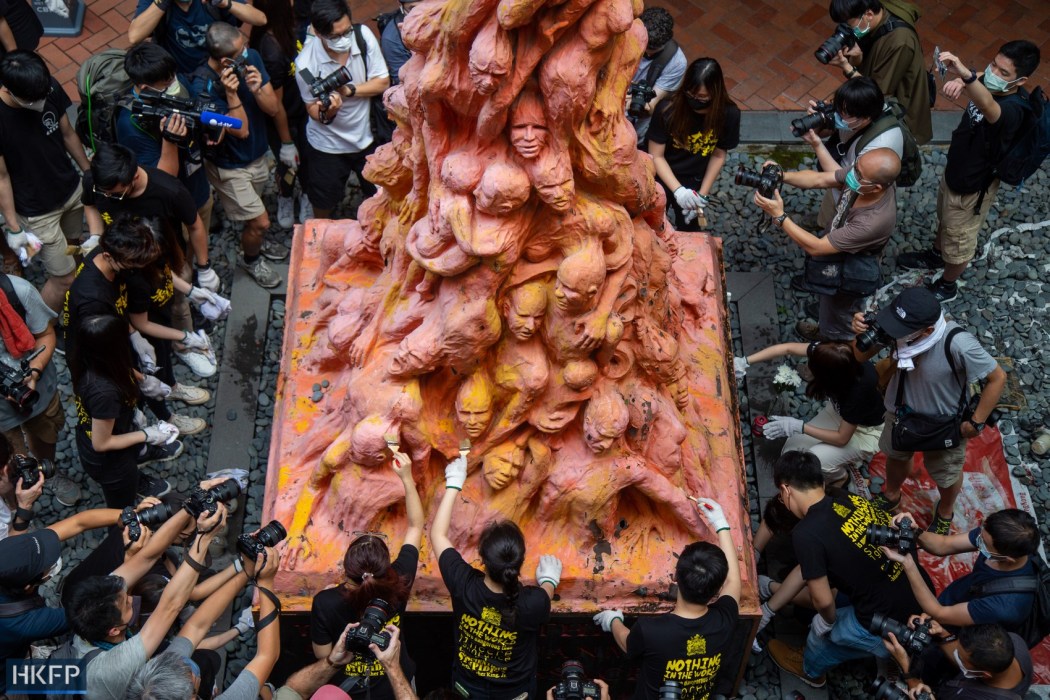Hong Kong’s security chief has evaded questions over whether publicly mourning victims of the 1989 Tiananmen crackdown is a violation of the Beijing-imposed national security law. Meanwhile, more political titles have disappeared from the shelves of the city’s public libraries, local media reported.
Secretary for Security Chris Tang evaded questions from a reporter on Monday over whether members of public mourning victims of the crackdown would be committing subversion or sedition, ahead of the June 4 anniversary of the incident.

The security chief was also asked whether the authorities had received any applications to hold public commemorations: “Regarding June 4, we have yet to receive any applications to hold public events… If we receive any [applications], we will handle them in accordance to the law and our procedures.”
Tang did not respond to questions as to whether participants of the commemorations would be in violation of the sweeping security legislation. Until 2020, Hong Kong was one of the few places on Chinese soil where authorities allowed public commemorations of the crackdown. The police have cordoned off Victoria Park, where previous vigils were held, for two consecutive years ahead of June 4.

The Tiananmen crackdown occurred on June 4, 1989 ending months of student-led demonstrations in China. It is estimated that hundreds, perhaps thousands, died when the People’s Liberation Army cracked down on protesters in Beijing.
Victoria Park venue
Part of Causeway Bay’s Victoria Park will be closed “for maintenance” until the end of June this year, the government said earlier this month. Meanwhile, a pro-Beijing group has applied to host a shopping event in key parts of the park between May 30 and June 7.
Since the Covid-19 outbreak and the implementation of the national security law, the administration has rejected applications to hold public mourning events.
The city’s universities, including the University of Hong Kong (HKU) and the Chinese University of Hong Kong, also removed monuments connected to the crackdown from their campuses.

The national security police also seized the Pillar of Shame – which was removed from campus by HKU December 2021 – earlier this month as evidence in an incitement to subversion case.
The now-defunct organiser of Hong Kong’s annual vigils, the Hong Kong Alliance in Support of Patriotic Democratic Movements of China, has been charged under the security law along with three of its former leaders.
The Alliance, its ex-chairperson Lee Cheuk-yan, and ex-vice-chairs Albert Ho and Chow Hang-tung, stand accused of incitement to subversion under the legislation.
Library books
Following the suspension of a political cartoon strip column last week, local media – including Ming Pao- reported that more political titles have disappeared from the city’s public libraries.

Ming Pao suspended the satirical comic column of Zunzi last Wednesday, after the prominent political cartoonist came under repeated criticisms from the government over the past months. The artist’s books were later taken off public library shelves, with searches for “Zunzi” or his real name – Wong Kei-kwan – yielding no results on the public library’s official website.
More political titles, including books by former lawmaker Margaret Ng, political scholar Ma Ngok, and founder of the Alliance Szeto Wah, were found to have been removed from public libraries, Ming Pao reported on Monday.
The security chief said on Monday evening that he was sure that the Leisure and Cultural Services Department had their own policies regarding library books.
Tang added he was also sure that “safeguarding national security is high on the agenda of each individual department and bureau.”
Rights, including the freedom of speech, are protected under the Basic Law and the security law, the security chief said. But those in violation of the security legislation will be handled “in accordance with the existing law,” he added.
HKFP reported in 2021 that Hong Kong public libraries, over the preceding 12 years, had removed 29 out of 149 books about the Tiananmen crackdown from their shelves, a total of 263 individual titles.
Support HKFP | Policies & Ethics | Error/typo? | Contact Us | Newsletter | Transparency & Annual Report | Apps
Help safeguard press freedom & keep HKFP free for all readers by supporting our team
























